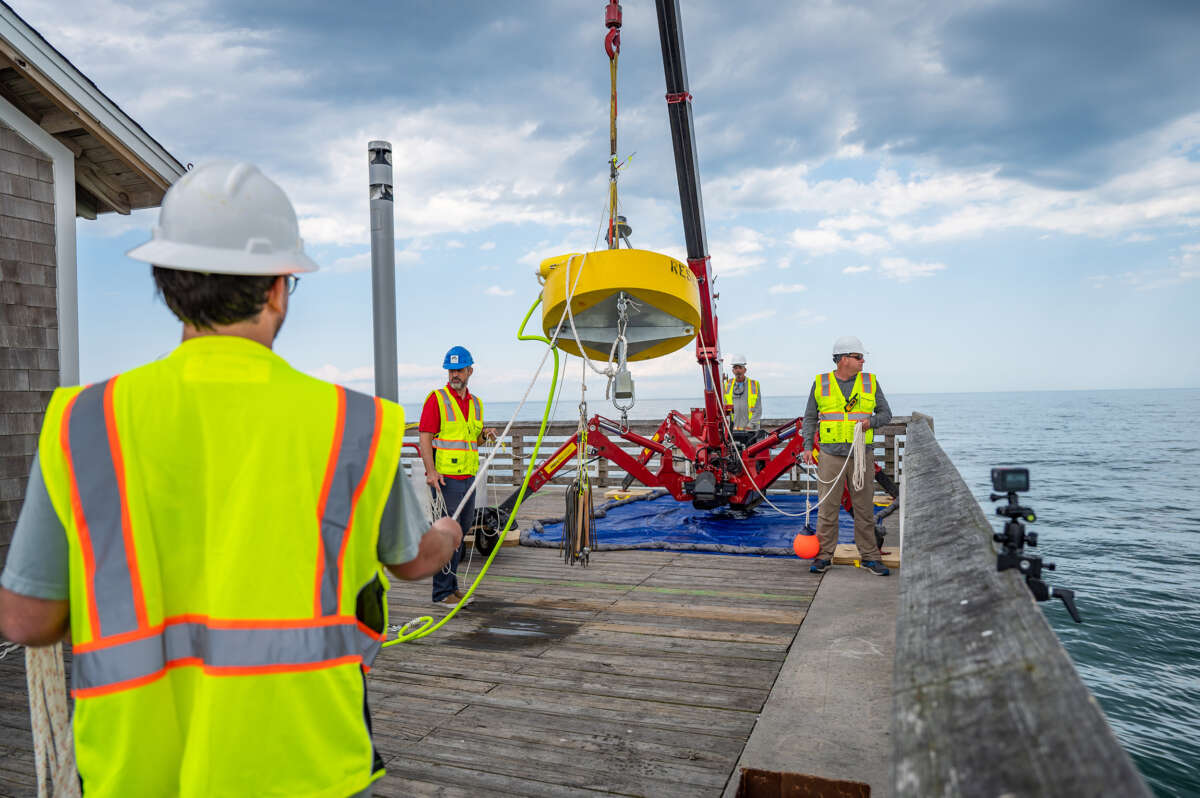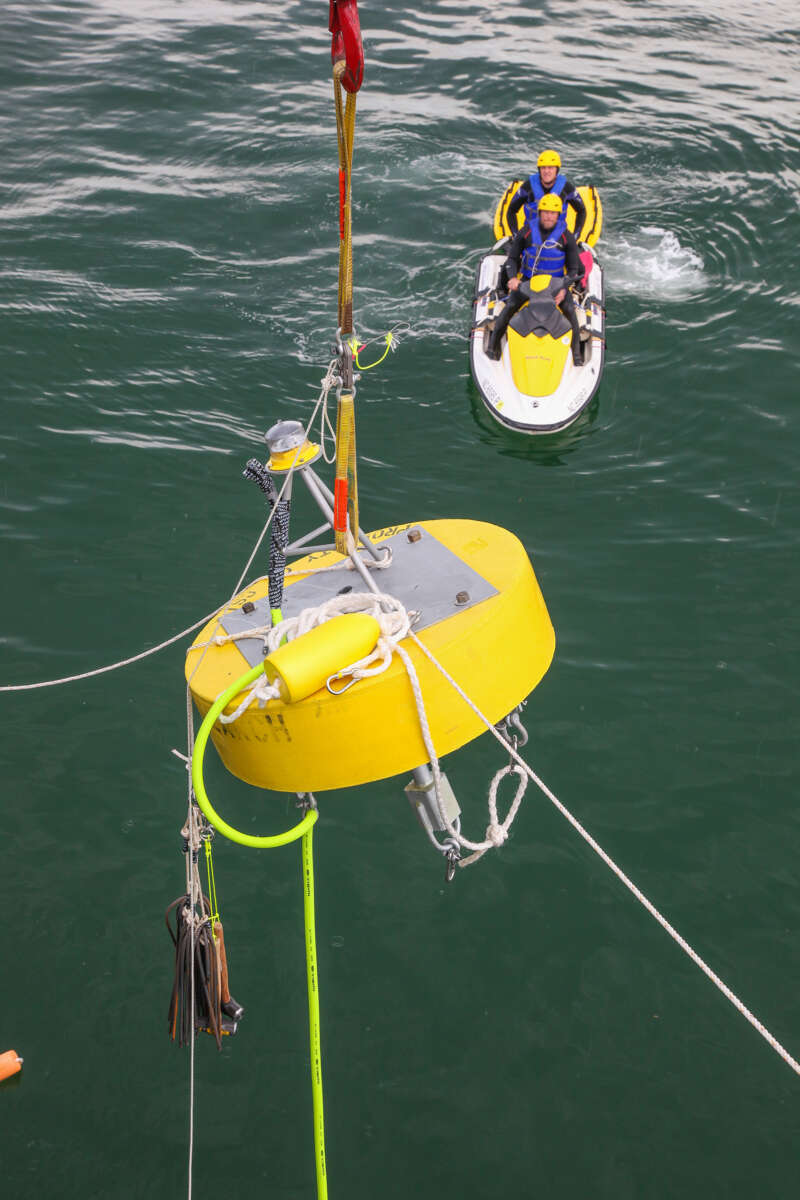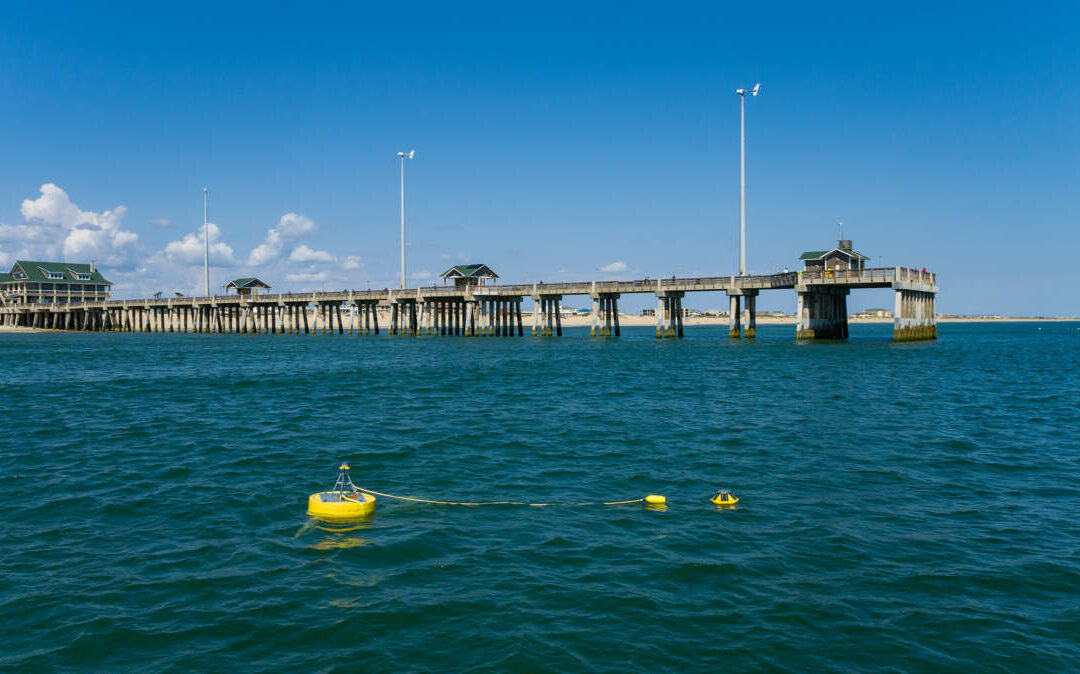It’s the final countdown to the DRINK stage of the $3.3M Waves to Water Prize! The competition, which is sponsored by the U.S. Department of Energy (DOE) and the National Renewable Energy Lab (NREL), requires contestants to build wave-powered desalination systems that could be used in future disaster relief scenarios. The Coastal Studies Institute (CSI) and Jennette’s Pier will host the competitors as they put their devices to the test during the DRINK stage.
Now less than a year away, the CSI and Jennette’s Pier team is getting ready to rock and roll. While the remaining contestants are currently creating their wave-powered desalination systems, the host organizations have been busy coordinating with DOE and NREL to ensure everything is in place for “the big show” at Jennette’s Pier in April 2022.

Jennette’s Pier Director Mike Remige (second from left) and NCROEP Director George Bonner (far right) assist with crane operations as the team lifts the test article up and over the side of the pier.

As the test article was lowered into the water, CSI Executive Director Reide Corbett and NCROEP Asst. Director for Science & Research Mike Muglia waited on a jet ski. The two towed the buoy to its anchor site.
Most recently, the folks at CSI and Jennette’s Pier orchestrated a test article deployment at Jennette’s Pier in April. To say the deployment was no small feat would be an understatement. All in all, there were close to twenty people involved, from drone flyers and crane operators to divers and marine craft drivers! The test article was a large buoy, crafted by team members at CSI, which had to be lifted and dropped over the side of Jennette’s Pier and anchored into place about 100 yards from the pier. The buoy then had to stay in place for five days and be retrieved. And as if all of that wasn’t enough, the deployment and retrieval had to line up with a good “weather window”, a period of minimal wind and calm seas.
Despite so many things needing to be done and aligned, the deployment was a huge success from start to finish, and the team was able to accomplish the main goals for the project by demonstrating a safe and effective device deployment and retrieval, as well as a strong anchoring system to hold the buoy in place for an extended period. In fact, the team was successful in spite of the designated weather window including a short period with winds in excess of 40 mph whipping up the ocean in the area.
“The excitement that Jennette’s Pier and CSI were selected by NREL and DOE to host the Waves to Water Prize in 2022 continues! It was thrilling to see the plans our team has discussed and carefully made successfully play out in real life last week. We are proud to apply our coastal expertise and skills to the exploration of solutions to clean energy and drinking water challenges.”, shared North Carolina Renewable Ocean Energy Program (NCROEP) Associate Director Dr. Lindsay Dubbs.
The excitement Dubbs mentioned was not only palpable across the team, but members of the public felt it too.
“It was great to witness the level of interest from the pier guests who just happened to be visiting on the deployment and retrieval days. Many asked great questions that allowed us the opportunity to start a conversation about the Waves to Water Prize and, ultimately, marine renewable energy devices, the partnership between the Coastal Studies Institute and Jennette’s Pier, and the work of the NC Renewable Ocean Energy Program.”, said Jennette’s Pier Director Mike Remige.
In the coming months, CSI and Jennette’s Pier team members will continue to meet with DOE and NREL to further map logistics in preparation for the upcoming DRINK phase, and the organizations will also schedule another test deployment in December. For the most up-to-date information about Jennette’s Pier and CSI’s role in the Waves to Water Prize, be sure to follow CSI on Twitter, Instagram, and Facebook.



 Based at the Coastal Studies Institute (CSI), the North Carolina Renewable Ocean Energy Program (NCROEP) advances inter-disciplinary marine energy solutions across UNC System partner colleges of engineering at NC State University, UNC Charlotte, and NC A&T University. Click on the links below for more information.
Based at the Coastal Studies Institute (CSI), the North Carolina Renewable Ocean Energy Program (NCROEP) advances inter-disciplinary marine energy solutions across UNC System partner colleges of engineering at NC State University, UNC Charlotte, and NC A&T University. Click on the links below for more information. ECU's Integrated Coastal Programs (ECU ICP) is a leader in coastal and marine research, education, and engagement. ECU ICP includes the Coastal Studies Institute, ECU's Department of Coastal Studies, and ECU Diving and Water Safety.
ECU's Integrated Coastal Programs (ECU ICP) is a leader in coastal and marine research, education, and engagement. ECU ICP includes the Coastal Studies Institute, ECU's Department of Coastal Studies, and ECU Diving and Water Safety. The ECU Outer Banks campus is home to the Coastal Studies Institute.
The ECU Outer Banks campus is home to the Coastal Studies Institute.

